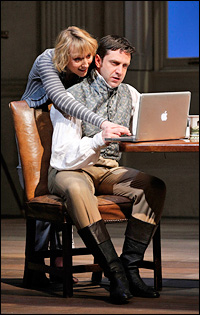
*
Arcadia: A place that's "simple," "pastoral," says the dictionary. Simple? A play by Tom Stoppard? Pastoral? Well, there is a tortoise in it — which does, I suppose, count as nature.
Arcadia — the play, not the definition — is so unsimple that most of us who love it are still unraveling its many levels some 18 years after its 1993 premiere. The Broadway revival is now at the Ethel Barrymore Theatre. Its author, Tom Stoppard, calls it "a thriller and a romantic tragedy with jokes."
Stoppard is the ultimate "on the one hand but on the other hand" playwright of our generation, taking such joy in both language and ideas that his plays in general, and this play in particular, posit dozens, perhaps hundreds of ideas, only to set them aside within moments for equally exciting contradictory ones. "I've always been slightly bewildered by writers who were certain about things," he says. "I've always been very uncertain. So I didn't make a conscious decision that here was a way to write which had a kind of internal dramatic momentum. I believe you write off your nerve ends and what comes out of your brain is a result of that."
Arcadia's starting point was a place. "I began to think about a room in which things happened 180 years apart but the room would stay just the same," Stoppard says. "I had a sense that what would make the play would be if the audience was in the know when the modern characters were trying to figure out what happened a century earlier."
| |
 |
|
| Lia Williams and Raúl Esparza | ||
| photo by Carol Rosegg |
Bursting with Stoppard's irrepressible humor, Arcadia wears its erudition lightly. Its characters include a number of comic and literary figures as well as a precocious genius (Bel Powley) being taught by a sexy Byronic tutor (Tom Riley) in the past and a pair of savvy siblings (Raúl Esparza and Grace Gummer) in the present. A tortoise and an aristocratic family straddle both centuries.
Stoppard has the ability to build characters that the audience likes, which is a good thing because our affection allows us to stay with them when they set off into discussions of hard-to-grasp subjects. Here, Stoppard's people touch on Fermat's Last Theorem, Latin translation, gardening (there's the pastoral again), chaos theory, academic rigor and rice pudding.
Stoppard's last New York production was The Coast of Utopia trilogy, and he is happy to be back: "The whole process of putting a play on in New York is quite intense.... One feels in New York that making it work is the team's sole occupation. Everybody, from the stage doorman to the leading actor, feels a responsibility for its success. So when it works, there's a corresponding degree of anxiety and celebration."
Arcadia has always seemed to me to be the dramatic equivalent of a painting by Rembrandt, say, "The Night Watch," in which, every time you see it, you find something you have never seen before. For Stoppard himself, the gift is simpler: "Writers," he says, "when the work goes well, should not feel clever; they should feel lucky."
(London and New York writer Ruth Leon pens Playbill.com's monthly A Letter From London column.)











